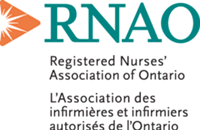Nurses welcome report, and urge structural reform to speed up access to home and community care
TORONTO, March 12, 2015 /CNW/ - A report released today by the Ontario government outlines important functional changes to the existing home and community care system, but broader structural reform will be needed to strengthen timely access to these services for Ontarians, says the provincial association representing registered nurses, nurse practitioners, and nursing students.
The Registered Nurses' Association of Ontario (RNAO) welcomes the report from the Expert Group on Home and Community Care, chaired by nurse leader Gail Donner. The association applauds the Expert Group for recognizing the need to expand the publicly-funded "basket of services" in home and community care – from health promotion to end-of-life care. Nurses also urge government to substantially increase its investment to ensure these not-for-profit services are universally accessible to people in all corners of the province, says RNAO CEO Doris Grinspun.
"As nurses, we see tremendous positive steps in this report, and we want to ensure the focus remains on publicly funded, not-for-profit options," Grinspun says. "If this government is serious about fixing the system and providing care closer to home, it's time to take real action."
RNAO fully endorses an increased role for the Local Health Integration Networks (LHINs), as detailed in the report, allowing them to work directly with primary care providers to improve system alignment. However, the association cautions against the use of integrated funding models rooted in hospitals, and instead insists that home and community services be anchored in primary care.
While system restructuring was outside of its mandate, the Expert Group found that the current structure of home and community care isn't working. "Many told us that families have to deal with too many different agencies and that the current structure is cumbersome, has too much overlap, is not efficient and is not delivering the services they need," the report states.
In 2012, RNAO first introduced the Enhancing Community Care for Ontarians (ECCO) model which, if implemented, would streamline home and community care through transformative change. Using ECCO, RNAO made several recommendations to the Expert Group, including:
- Root the system in primary care, and place a higher focus on health promotion, disease prevention, mental health, and chronic disease prevention and management
- Enable LHINs to perform whole-system regional planning, funding, service agreements and accountability functions
- Transition current Community Care Access Centre (CCAC) Care Co-ordinators – with their compensation fully intact – into hospitals as discharge coordinators, and into primary care as care coordinators for the most complex patients and to assist them with health system navigation
- Eliminate CCACs, as they represent expensive structural duplication, and use more than $200 million currently spent on CCACs administration, to instead increase hours of direct home care for Ontarians
- Expand not-for profit and universal access to home health care
"Ontario's growing and aging population is set to become one of the defining health-care challenges of our time," says RNAO President Vanessa Burkoski. "Nurses have proposed a bold approach, which would allow Ontario to tackle this challenge by supporting people to age at home as vibrant members of our communities, and advancing a person-centred health system, while at the same time improving health and financial outcomes," adding that "now it's up to the government to act."
This year marks the Registered Nurses' Association of Ontario's (RNAO) 90th anniversary. RNAO is the professional association representing registered nurses, nurse practitioners, and nursing students in Ontario. Since 1925, RNAO has advocated for healthy public policy, promoted excellence in nursing practice, increased nurses' contribution to shaping the health-care system, and influenced decisions that affect nurses and the public they serve. For more information about RNAO, visit our website at RNAO.ca or follow us on Facebook and Twitter.
SOURCE Registered Nurses' Association of Ontario

Daniel Punch, Editorial assistant, RNAO, Tel: 416-408-5610 / 1-800-268-7199, ext. 211, [email protected]

Share this article